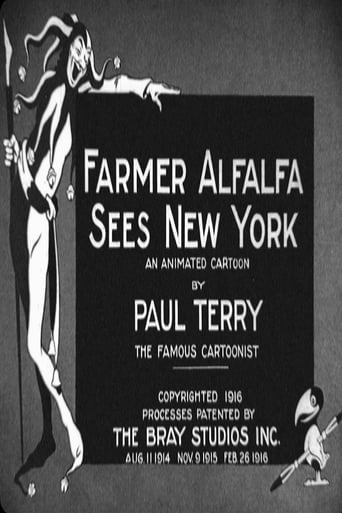

IF THERE IS one trait that is nearly universally peculiar to early animation it would be that they are literally "Animated Cartoons." That is, they have all the same traits that standard newspaper & magazines have; save the illusion of motion. And,of course, we all are very familiar with how that illusion is accomplished.THIS VERY EARLY, pre-World War I, pre-1920s and pre-Prohibition era animated short from the J.R. Bray Studios is a prime example of what we speak. The creator of the good Farmer Al Falfa, Paul Terry, also directed the film and included so many of the traits of which we speak.HENCE WE SEE limited movement, the frequent inclusion of static poses and the inter-media proliferation of the visual aids of words and symbols. So we see the use of frequent "BANGS!", "Crashes", 'Sawing Wood' (for snoring) and throbbing Hearts (for Love). There are many more; but you get the drift.TRUE TO THE form and the level of animation of the times, we get a concisely told, waste no film story. Basically, Farmer Al is seen traveling to NYC via Railroad. As he arrives, he is spotted by a thug with binoculars; who immediately telephones a painted lady of the night. She gets his attention and brings him to 'The Gilded Club' where he is coerced into popping for some rounds of drinks, when the floozy runs out with his ca$h.HE THEN GETS intercepted by a low life ruffian. He is steered to a private poker game with "Millionaires." There he is being fleeced royally by three card sharks; when he is saved by his faithful pup, who aids him in winning the big pot on the table.THE TWO FLEE and successfully evade the goon watching outside the door. In the final scene, we see the fade out of the virtuous rustic counting all of his considerable winnings.WE CAN CHALK one up for the virtuous! WITHIN A RELATIVELY SHORT period, Paul Terry would move on from the J.R. Bray Studio. After working for several other companies, he was to open his own studio, TERRYTOONS, in 1931.DURING ALL OF this change of venue and turmoil, one thing did remain constant. He managed to retain the rights to FARMER AL FALFA and continued to use him for over forty years, right down to having a FARMER AL FALFA TV Series on CBS Saturday mornings.NOW SCHULTZ, CAN you say "Longevity?"
... View More"Farmer Al Falfa Sees New York" is only the ninth Farmer Al Falfa cartoon and comes from the beginning of the era in American animation whereby animated films were folded into newsreels, or film magazines compiled on behalf of newspaper syndicates. This was made for the Bray studio -- who held the patents on cel animation at the time -- by Paul Terry, who would later become a major executive as the head of Terrytoons but was in 1916 a former junior newspaper cartoonist trying to make his way in the new field of animation; many newspaper men who tried the new medium went back to print media when they figured out how much work it was. This cartoon is exceptionally good for 1916; the backgrounds, while spartan, do the job admirably, and while the bad guys -- particularly Sapho, the female crook, still bear the thick outlines of newspaper illustration, but Farmer Al Falfa and his pup both have the special characteristics of animated characters. From his later corporate heritage, Terry has earned a reputation for being miserly and lax on quality control, and even not long from this you can find Farmer Al Falfas that do not move as naturally, compromised somewhat by shortcuts and tight deadlines. But at the very start, he was much on the leading edge of establishing quality animation of any of the newspaper animators save Winsor McCay, as "Farmer Al Falfa Sees New York" makes abundantly clear.
... View More